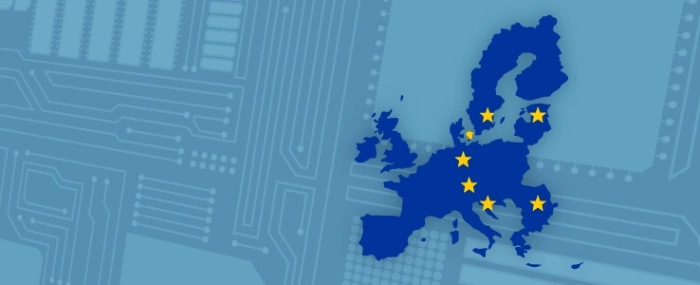
Standardising standards to support EU industry competitiveness
In his previous guest article, Dirk Stans, Managing Partner at Eurocircuits, outlined three key actions needed to strengthen Europe’s electronics industry. Now, in this follow-up, he delves deeper into the third measure: Standardising standards to support EU industry competitiveness.
Author: Dirk Stans – Managing Partner at Eurocircuits
I would like to bring forward a proposal that, although venturing into somewhat unfamiliar territory for me, addresses a growing concern across the electronics and manufacturing industries: the overwhelming complexity and financial burden of complying with a multitude of standards and regulations.
While I fully acknowledge the importance of these standards in ensuring product quality and safety, the sheer number and scope of them often place an undue burden on companies, particularly small and medium-sized enterprises (SMEs), which form the backbone of the EU economy.
Goals and rationale
The goal of this proposal is to explore the possibility of streamlining and simplifying standards to reduce unnecessary complexity and cost. Large corporations may have the resources to navigate the extensive web of certifications and regulatory requirements, but for SMEs, compliance with an ever-growing list of standards creates significant overhead costs, often making their products less competitive. Many SMEs find themselves priced out of the market as they struggle to keep up with these demands, while large enterprises and non-EU businesses, where similar certifications are often easier to obtain, are able to maintain a competitive advantage.
Moreover, while we all recognise the value of standards in ensuring quality, the question must be asked: Do all these individual standards truly contribute to a better product or service, or are they sometimes redundant? If certain standards overlap or add little additional value, we may be inadvertently creating barriers for our own industries.
It is in the interest of the EU to examine this issue and determine if we can consolidate or harmonise standards across sectors in a way that maintains quality while alleviating unnecessary burdens on businesses.
Proposed solution: establishment of an expert group
To address this challenge, I propose the formation of an expert group tasked with examining the current landscape of standards and certifications, with the aim of identifying areas where simplification and harmonisation are possible.
The objective would be to create a streamlined set of standards that retain the necessary focus on quality and safety but eliminate redundancies and inefficiencies. This group would include representatives from across the industry, including SMEs, large enterprises, and regulatory bodies, ensuring that the diverse perspectives and needs of the entire EU business community are taken into account.
The potential benefits of this initiative are twofold:
- Cost savings for SMEs, which would be better able to compete on a level playing field, both within the EU and globally.
- Improved competitiveness for EU industries overall, by removing unnecessary hurdles that slow innovation and add to production costs.
Feasibility and implementation
This proposal does not require significant financial investment. The costs of convening an expert group and conducting an analysis of existing standards are relatively minor, especially when weighed against the potential savings for businesses across the EU.
Furthermore, the potential for harmonising standards is not an abstract or theoretical notion. We already see examples of successful standardisation efforts in other sectors, where rationalising guidelines has led to clearer regulations, more efficient compliance processes, and reduced costs. The same can and should be done for the electronics and manufacturing industries, where standardisation could yield tangible benefits without compromising quality.
Challenges and considerations
There may be objections from certain sectors claiming that their industries have unique needs and therefore cannot follow simplified standards. While this is a valid consideration, it is important to recognise that uniqueness is often a matter of degree. If an industry is 90% aligned with common standards, it may only require a 10% exception, rather than an entirely different set of regulations.
This proposal is not about eliminating the necessary flexibility for different sectors but rather about finding common ground wherever possible.
By taking a pragmatic approach, we can work together to reduce unnecessary complexity while maintaining the high standards that the EU is known for.
Conclusion
In conclusion, the proposal to simplify and standardise standards offers a clear path to reducing costs for SMEs, improving the competitiveness of EU industries, and ensuring a more level playing field for businesses within and outside the EU.
It is a proposal that requires modest financial outlay but offers significant potential for positive impact.
I believe this initiative is worth serious consideration, as it aligns with the broader goals of enhancing the EU’s economic resilience and maintaining our commitment to quality.
Take this for what it is worth, but in my view, the time for action has long since arrived. Endless discussions without decisions are no longer an option.
Dirk Stans, Managing Partner at Eurocircuits, drives the group's sales and marketing strategy. With over 20 years of active engagement in FHI, the technology federation for Dutch-speaking regions, he has served as both branch and federation chairman. Passionate about European technological manufacturing, particularly electronics production, Dirk remains committed to strengthening the industry.
At Evertiq Expo Berlin on June 5, 2025, Dirk Stans will take the stage to expand on the key themes explored in this article. Join us as he shares his expert insights on the industry’s pressing issues, potential solutions, and the steps needed to strengthen Europe’s position in the global electronics landscape.


